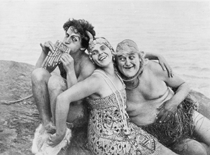PREVIOUS CINEFESTS
overview2019201820172016201520142013201220112010200920082007200620052004conferenceHOMEABOUT USPARTNERSSUPPORTERS & SPONSORSFAQPDF DOWNLOADCONTACTPRIVACY POLICYcinefest is organized by:
cinefest is supported by


Hustlers and Partisans, sex-bombs and dagos, tenors and death angels are a few of the many facets of German-Italian film relations which are in the spotlight at cinefest 2010. cinefest will shed light on these connections; from German-Italian productions and the institutional cooperation between Berlin and Rome, to people who actively pursued a career in both countries as well as a look into the numerous ways that Germany and Italy depicted each other in film.
Italian filmmakers have played an important role in German cinema since the 1920s. Directors like Emilio Ghione and Gennari Righelli made popular movies and in the early sound era, Carmine Gallone and Augusto Genina also filmed in Germany. Marcella Albani, diva of the silent film, and action star Carlo Aldini fascinated the German audience and were followed by popular musical films starring tenor Beniamino Gigli and in the 1950s the multitalented Caterina Valente.
Transalpine relations intensified after 1930 with the production of German-Italian multi-language versions and the close cultural collaboration of the Nazi-Regime with Fascism. Despite this, it was still possible for German and Austrian emigrants like Max Ophüls and Max Neufeld to make movies at Italian production companies.
German-Italian co-productions ranged from early musical comedies to post-war crime movies, sex films and of course the Spaghetti-westerns of the 1960s.
German cinema saw Italy, with its exotic scenery, as the perfect setting for melodramas, cheerful musicals and holiday comedies. Picturesque scenery in Venice or Rome provided a dreamlike background for Max Reinhardt's EINE VENEZIANISCHE NACHT (1913) or the heroic deeds of Hans Albers (EIN GEWISSER HERR GRAN / A CERTAIN MR. GRAN, 1933). In post-war times, Italy became a setting for touristic desires and erotic fantasies.
Witnessing war and fascism led to Roberto Rossellini's preoccupations with the resistance against occupying German forces (ROMA CITTÀ APERTA / ROME, OPEN CITY, 1945) and the conditions in postwar Germany (GERMANIA ANNO ZERO / GERMANY YEAR ZERO, 1947/48), as well as Wolfgang Staudte's satire on Italian "war heroism" (ALWAYS VICTORIOUS, 1958) and an heroic look at the Wehrmacht (DIE GRÜNEN TEUFEL VON MONTE CASSINO,1957/58). Later films like I SEQUESTRATU DI ALTONA / THE CONDEMMED OF ALTONA (1962) and IL PORTIERE DI NOTTE / THE NIGHT PORTER (1973/74) used very different approaches to address the aftermath of National-socialism. The influx of guest-workers and cultural differences were dealt with both critically (PALERMO ODER WOLFSBURG, 1979/80) and as an emotional family saga (SOLINO, 2002).
In East-Germany, Italian Neorealism had an especially strong influence on a young generation of DEFA-directors, who used it in the 1960s as an escape from the corset of "socialist realism".
Each year, cinefest and the Film History Conference deal with an exciting chapter of European film history, which for the most part has been overlooked or neglected in research and discussion.
to the archive
The 7th cinefest is also part of the "Va bene?! La Germania in Italiano. Itlaien auf Deutsch" project of Goethe-Institute Italy.
![]()
in Cooperation with
Kinemathek Hamburg - Kommunales Kino Metropolis
Deutsches Historisches Museum / Zeughauskino, Berlin
Narodní filmový archiv, Prague
Filmarchiv Austria, Vienna
Cinémathèque Suisse Lausanne / Filmpodium Zurich
with friendly support of:
absolutMedien, Berlin
Arte, Straßburg
Cinecentrum, Hamburg
DEFA-Stiftung, Berlin
Deutsch-Italienische Gesellschaft e.V., Hamburg
Deutsche Kinemathek - Museum für Film und Fernsehen, Berlin
Deutsche Wochenschau GmbH, Hamburg
Deutsches Filminstitut – DIF, Frankfurt
Due Baristi Espressobar, Hamburg
Filmförderung Hamburg Schleswig-Holstein GmbH
Friedrich-Wilhelm-Murnau-Stiftung Wiesbaden
Goethe-Institut Hamburg
Goethe-Institut Italien
Istituto Italiano di Cultura Berlino
Istituto Italiano di Cultura Hamburg
Jugendinformationszentrum - JIZ, Hamburg
Kinowelt Filmverleih, Leipzig
Media Desk Deutschland, Hamburg
Novum Hotels, Hamburg
Skoda Auto Deutschland GmbH
SK LimousineServices, Hamburg
TaurusMedia Licence Service GmbH, Unterföhring
Transit Film GmbH, Munich
Universität Hamburg – Institut für Neuere deutsche Literatur und Medienkultur
Media partner: FilmDienst
CineGraph – Hamburgisches Centrum für Filmforschung e.V. is funded by the Hamburg department of culture and media (Behörde für Kultur und Medien der Freien und Hansestadt Hamburg)
![]()